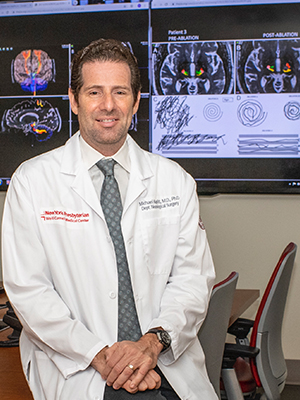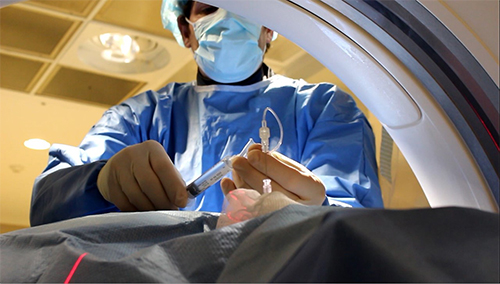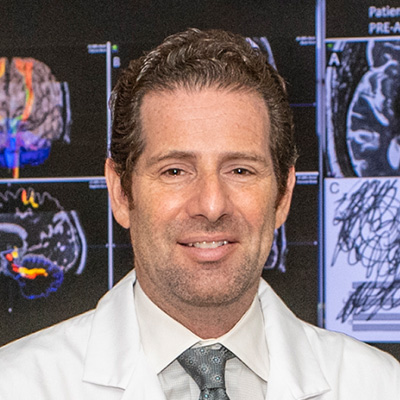Michael G. Kaplitt, MD, PhD, Director of Functional Neurosurgery in the Weill Cornell Brain and Spine Center and Vice Chair for Research in the Department of Neurological Surgery at Weill Cornell Medicine, is an internationally recognized leader in functional neurosurgery, particularly for movement disorders. Among Dr. Kaplitt’s many scientific and clinical achievements is the development and first applications of gene therapy to the brain and nervous system. He and his research team have identified key pathways that they are using to unleash the potential of gene therapies for the treatment of neurodegenerative diseases by delivering functional genetic material to cells in order to correct a defective gene.
Dr. Michael Kaplitt
“At Weill Cornell Medicine, we literally developed the field of gene therapies for neurodegenerative disease and neurological diseases in general,” says Dr. Kaplitt, who in 1994 pioneered a now widely used gene-delivery technique for the brain using an altered, harmless form of adeno-associated virus. “The vast majority of active clinical trials of gene therapies for neurological diseases today, whether it’s Parkinson’s disease, Alzheimer’s disease, pediatric genetic disorders, and others, use the delivery vehicle that we developed and are continuing to advance in numerous ways.”
In 2003, Dr. Kaplitt performed the world's first gene therapy surgery for Parkinson’s at NewYork-Presbyterian/
Parkinson’s disease gene therapy has moved from purely animal research three decades ago to initial human studies two decades ago to many applications moving into late-stage trials currently. Recent successes and promising new technology should only accelerate the advance of gene therapy into active clinical practice.
— Dr. Michael Kaplitt
Gene Therapies Targeting Alzheimer’s and Parkinson’s Disease
Dr. Kaplitt is currently collaborating with Ronald G. Crystal, MD, Chairman of the Department of Genetic Medicine at Weill Cornell Medicine, in a clinical trial for Alzheimer’s disease. “We are using gene therapy to try to correct what we believe is one of the genetic causes of Alzheimer’s disease – the Apolipoprotein E (APOE) gene,” says Dr. Kaplitt, who notes that of the three forms of APOE, APOE4 is the strongest risk factor gene for developing Alzheimer’s, whereas patients who have the APOE2 variant seem to be much more protected from the disease. “We are trying to deliver the beneficial copy of APOE2 into the brain through an injection into the cerebrospinal fluid at the base of the brain to globally cover the brain in an attempt to improve some of the pathology.” Dr. Kaplitt serves as principal investigator for this interventional trial, which is currently recruiting patients.
Dr. Kaplitt delivers gene therapy to a patient with Parkinson’s disease.
In another trial, Dr. Kaplitt is taking a similar approach to correct a genetic form of Parkinson’s disease. “Patients who have two abnormal copies of the gene Glucocerebrosidase or GBA have a pediatric disorder called Gaucher’s disease,” explains Dr. Kaplitt. “But it was recognized years ago that family members of Gaucher’s patients who have only one abnormal copy of this gene don’t develop this disease, but they had a much higher likelihood of developing Parkinson’s disease over time than the general population. Many epidemiology and genetic studies have shown that abnormalities in one copy of the GBA gene can lead to Parkinson’s.”
“The idea is that if you can deliver a normal copy of the GBA gene to correct the abnormality, you might improve patients who have this variant,” continues Dr. Kaplitt, who has been collaborating with Harini Sarva, MD, a neurologist specializing in movement disorders at NewYork-Presbyterian/
Dr. Kaplitt and his research team are also exploring gene therapy for chronic pain. “We have been successful in implanting electrical nerve stimulation devices to control pain,” says Dr. Kaplitt. “Now we are working on ways in which we can inject viruses into areas of the body that have pain and in this minimally invasive approach potentially reverse the pain in a regulated fashion.”
In addition, Dr. Kaplitt recently completed an NIH-funded study with colleagues at The Rockefeller University using magnetogenetics, a biological technique that involves the use of magnetic fields to remotely control cell activity. “We are just about to publish some very good data showing that we can improve Parkinson’s disease in animal models by delivering a virus to regulate the function of key brain circuits with magnetic fields, without any implants or drugs,” says Dr. Kaplitt.
He has also been funded by the Focused Ultrasound Foundation to use ultrasound to allow delivery of gene therapies to precise brain regions in animal models of Parkinson’s disease through a simple intravenous injection. This uses a technique similar to what Dr. Kaplitt is currently using in human patients to treat tremors and other Parkinson’s disease symptoms with non-invasive ultrasound waves. NewYork-Presbyterian/
Major Funding Propels Research in Parkinson’s
In October 2021, Dr. Kaplitt and his laboratory team were awarded a three-year, $8.9 million grant from Aligning Science Across Parkinson’s Disease (ASAP), in collaboration with the Michael J. Fox Foundation. The ASAP award is an ambitious and innovative multi-institutional effort to study how abnormal protein aggregates may spread from the gut to the brain to drive the early stages of Parkinson’s disease. “Interaction between the body and the brain is a very exciting and important area of research, and it is increasingly clear that, at least in some cases, Parkinson’s disease may begin in the gut, with the disease spreading through nerve connections to the brain and eventually throughout the brain,” says Dr. Kaplitt. “ASAP has funded several large teams around the country and internationally to address major questions in Parkinson’s. Our grant is designed to use these same types of minimally invasive, viral-based approaches that we have specialized in for three decades to study how Parkinson’s pathology spreads throughout the body and the brain, and hopefully see if we can try to prevent that spread.”
Dr. Kaplitt, who is the only neurosurgeon to lead a team that received the ASAP grant, serves as coordinating principal investigator along with researchers at Cornell University, Johns Hopkins Institute for Cell Engineering, and the Karolinska Institutet in Sweden on this initiative. “The whole idea of the gut-brain interaction is a key area of study in neuroscience and in the world. There is strong evidence that this is a major source of pathology in Parkinson’s disease, and we believe we have developed a very novel approach to treat this disease.”
“Whether we are bringing the latest surgical therapies to our patients or developing treatments of the future, our goal is always the same,” adds Dr. Kaplitt. “And that is to do whatever we can to use our skills and knowledge to help find new treatments, cure patients, and improve lives.”





